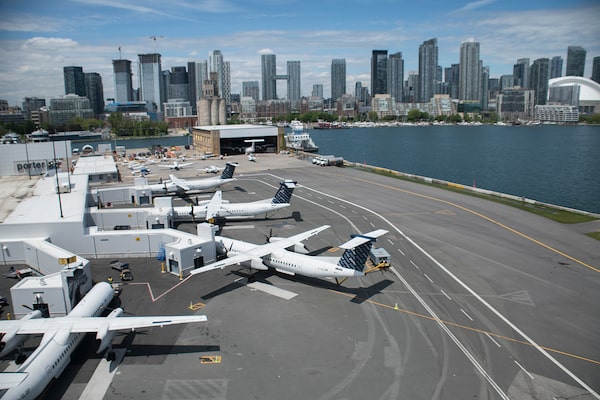
Billy Bishop Toronto City Airport on June 17, 2019.Fred Lum/The Globe and Mail
The government agency that owns Billy Bishop Toronto City Airport is seeking expressions of interest from investors to operate the airport, which has seen passenger traffic vanish in the pandemic.
The move to privatize operations of the island airport adjacent to downtown Toronto is being made more than a year into the COVID-19 crisis that has forced Porter Airlines and Air Canada to halt all commercial airline traffic at the airport.
Geoffrey Wilson, chief executive officer of PortsToronto, the agency that owns the airport and nearby port, said the potential investor is likely among the 25 or so institutional funds that invest in transportation infrastructure. Those funds include the Ontario Municipal Employees Retirement System, the Canada Pension Plan Investment Board and the Ontario Teachers’ Pension Plan.
The effort to find an investor-operator is driven by a need to ensure the airport can survive the pandemic and emerge from the crisis on strong financial footing, he said. A public-private partnership would be an extension of existing arrangements at the airport, he said, referring to Porter Airlines’ operations, terminal owner Nieuport Aviation and the Ornge air ambulance service.
Billy Bishop is Canada’s ninth-busiest airport by passenger volumes, with 2.8 million travellers in a typical year. The airport has been running on its cash reserves and is required to be financially self-sufficient. In good times, it operates on the landing fees, airport improvement charges and rent paid by tenants, like other Canadian airports.
“That means that there is no back-stop,” Mr. Wilson said. “There is no funding, for example, from our shareholders, the federal government.”
In a statement, PortsToronto said it is seeking “a financial investor that would be interested in operating the airport under lease ... in an effort to reduce PortsToronto’s overall debt position, restore and enhance liquidity; enable ongoing and future infrastructure investment; and ensure the airport’s long-term viability.”
“Airports in Canada are built on a user-pay model,” Mr. Wilson said. “We have no users.”
John Gradek, a lecturer on aviation leadership at McGill University in Montreal, said PortsToronto’s move underlines the crisis faced by the country’s air industry.
“They don’t see travel returning very quickly. They’re turning to the market to provide them with capital to invest in core activities at the airport,” Mr. Gradek said. “They don’t see much cash coming in from operations. They want cash from markets.”
Airlines, airports and the companies that serve them have laid off thousands of employees since the pandemic struck. Porter Airlines, the island airport’s main carrier, Sunwing Airlines Inc. and Transat AT Inc. have suspended operations amid a resurgent pandemic that has closed borders and prompted government to impose travel restrictions.
The federal government, the landlord for ports and airports, in the fall offered rent relief or deferrals to Canada’s airports. PortsToronto received a reduction in the gross revenue charge it pays to Ottawa, an amount that fell, in any case, owing to the loss of airplane traffic.
The Greater Toronto Airports Authority, operator of Toronto Pearson International Airport, last week said 2020 passenger volumes fell by 74 per cent from a year earlier.
Airports rely on passenger traffic for 90 per cent of their revenue and face a total of $5.5-billion in lost revenue for 2020 and 2021. To survive, the airports have taken on a total of $2.8-billion in debt, said Daniel-Robert Gooch, president of the Canadian Airports Council.
“This situation has been incredibly challenging for all the airports,” Mr. Gooch said. “Everybody is looking at whatever they can to be creative in terms of how ... [to] get through this.”
Your time is valuable. Have the Top Business Headlines newsletter conveniently delivered to your inbox in the morning or evening. Sign up today.